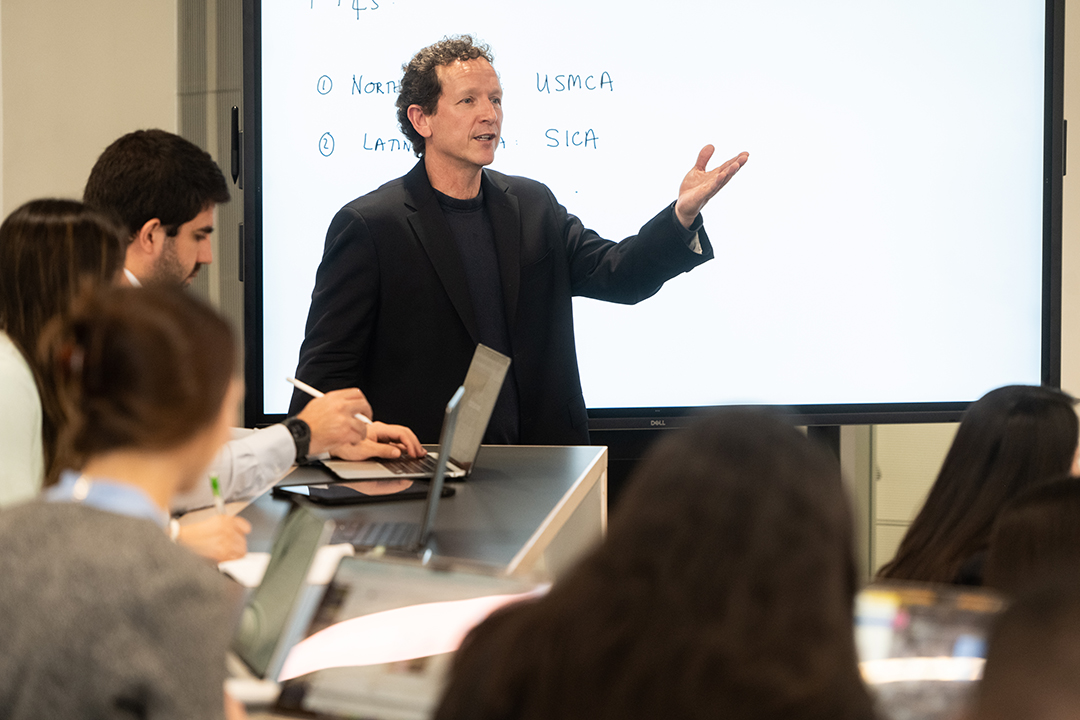Artificial Intelligence in Action

Artificial Intelligence in Action
The GW School of Business (GWSB) offers students several courses that tackle different aspects of artificial intelligence (AI) in fields ranging from marketing to information technology. GW students engage with forward-thinking faculty and use tools that pair AI with critical thinking, hands-on business experience and continuous improvement. The GW Business community is also greatly exposed to industry experts and professor research while in class and during events, all located in the heart of Washington, D.C.
GW Business and AI
GW Trustworthy AI Initiative
GW TAI brings together a collection of research and educational efforts of the esteemed faculty across the George Washington University to deliver timely education, foster problem-driven research and inform policy founded in deep scientific understanding.

GW Business Appoints Chief AI Officer
The appointment of Patrick Hall as the School’s first Chief AI Officer reflects GW Business’ commitment to supporting faculty and staff as we navigate rapid advancements in artificial intelligence.

Business and Policy Forum
For three years, the GW School of Business has brought together policy makers and industry experts to provide unprecedented forum that tackles some of the world's most pressing issues. Business & Policy Forum attendees hear and engage with key technology and government players.

Graduate Certificate in Artificial Intelligence
Acquire foundational knowledge and hands-on skills in machine learning, deep learning, embedded systems and apply them to Artificial Intelligence’s business applications to prepare for the vast opportunities that innovations in AI affords.
Faculty Findings in AI

GW Business Professor Gil Appel Finds Lower AI Literacy Predicts Greater AI Receptivity
Written by Sami Pabley

How to Use Generative AI as a Human Resource Management Assistant
Written by Prof. Herman Aguinis

How AI Can Change Human Decision Making (for Better or Worse)
Written by Prof. Donna Hoffman
Select Artificial Intelligence Courses
Information Systems & Technology Management
- ISTM 4214: Foundations of Artificial Intelligence
A comprehensive introduction to the recent developments in AI through the coverage of fundamental AI concepts, practical business applications and the hands-on experiences with modern deep learning frameworks such as Keras. Prerequisite: ISTM 3119.
Image
Instructor: Faith Bradley, Teaching Assistant Professor of Information Systems and Technology Management
- ISTM 4217: Internet of Things Management
Apache Spark technology skills to analyze huge data sets. Taught in Python, continuing on to learning to use Spark DataFrames with the latest Spark 2.0 syntax; the MLlib Machine Library with the DataFrame syntax and Spark.
Image
Instructor: Sunghun Chung, Assistant Professor of Information Systems and Technology Management
- ISTM 6214: Foundations of Artificial Intelligence
Foundations of artificial intelligence. Introduction to advanced programming design and development of solutions to automate business processes. Prerequisites: ISTM 3119 or ISTM 6200.
Image
Instructor: Sunghun Chung, Assistant Professor of Information Systems and Technology Management
- ISTM 6218: Business Applications of Artificial Intelligence
Comprehensive introduction to recent developments in artificial intelligence (AI) through the coverage of fundamental AI concepts, practical business applications, and hands-on experiences with modern deep learning frameworks. Prerequisites: ISTM 6214.
Image
Instructor: Faith Bradley, Teaching Assistant Professor of Information Systems and Technology Management
Decision Sciences
- DNSC 6290: Practical AI
Special topic; no course description available at this time.
Image
Instructor: Patrick Hall, Teaching Assistant Professor of Decision Sciences
- DNSC 6314: Machine Learning I
Various data preprocessing, statistics and machine learning techniques used to discover relationships in large data sets and build predictive models. Restricted to students in the MS in business analytics program. Prerequisites: DNSC 6303 and DNSC 6313.
Image
Instructor: Long He, Associate Professor of Decision Sciences
- DNSC 6315: Machine Learning II
Builds on the theoretical and practical aspects covered in DNSC 6314 and introduces new techniques featuring penalized regression, neural networks and deep learning, ensemble models, matrix factorization, model validation and model interpretation. Restricted to students in the MS in business analytics program. Prerequisites: DNSC 6307. Corequisites: DNSC 6314.
Image
Instructor: Long He, Associate Professor of Decision Sciences
- DNSC 6330: Responsible Machine Learning
A technical, nuts-and-bolts course about increasing transparency, fairness, security and privacy in machine learning. Prerequisites: DNSC 6314 and DNSC 6315; or DNSC 6232.
Image
Instructor: Patrick Hall, Teaching Assistant Professor of Decision Sciences
Marketing
- MKTG 4154/6252: Digital Marketing
The impact of technology on sales and marketing strategy. Customer relationship management, mobile commerce, e-branding, sales force technology enhancement, permission e-mail, online marketing research, and electronic channels of distribution.
Image
Instructor: Michael Tadesse, Teaching Assistant Professor of Marketing
- MKTG 4900/6290: AI Applications in Marketing
Special topic; no course description available at this time.
Image
Instructor: Michael Tadesse, Teaching Assistant Professor of Marketing
- MKTG 6264: AI & ML for Mktg Automation
Application of machine learning and artificial intelligence models to marketing-related data. Focus on automating procedures and communicating findings in a business environment. Recommended background: Basic statistics and some knowledge of R and Python. Please note: credit cannot be earned for this course and MKTG 4164.
Instructor: Harald Anderson, Adjunct Professor of Marketing
How Do GW Business Students Use AI?

Using AI Tools and Features
The George Washington University actively leverages emerging technologies to enhance teaching and learning across modalities. Faculty and students regularly use AI tools such as Google Gemini, Microsoft Copilot, and AI-enabled features in Zoom to support instruction, collaboration, and productivity.
x
Connecting the Digital World
With our global classrooms featuring interactive digital whiteboards and integrated video walls supporting content engagement, and virtual participation from guest speakers and remote students being supported with integrated PTZ robotic cameras and array ceiling microphones, GW Business can connect students to the world with advanced technology.

x

A Digitally Enhanced Classroom
Many courses at GW Business incorporate interactive simulations and scenario-based learning to deepen engagement. Additionally, our in-house multimedia studio produces high-quality video, podcasts, animation, and simulation content that enriches the online learning experience so that students can learn wherever, whenever.
x


